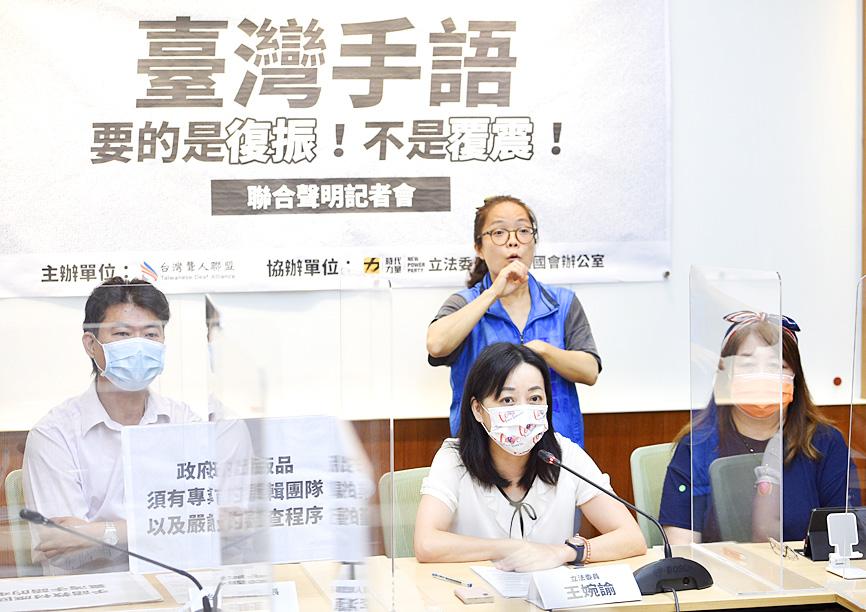The Taiwanese Deaf Alliance and other groups yesterday called on the government to use Taiwan Sign Language (TSL) instead of signed Mandarin in a book planned for toddlers, saying that TSL is a natural language that should be treated as distinct from Mandarin.
Due to its inclusion in the Development of National Languages Act (國家語言發展法), which was passed by the Legislative Yuan on Dec. 25, 2018, TSL has gradually gained attention, the alliance said in a joint statement with 26 other hearing loss associations.
The Social and Family Affairs Administration is in the process of creating an electronic book to teach sign language to children under the age of three, they said.

Photo: Peter Lo, Taipei Times
However, it plans to use signed Mandarin, also known as “grammatical sign language,” they said.
Signed Mandarin, which follows Mandarin grammar, is not a “real” language, while TSL is an independent language with its own grammatical rules, they said.
Using signed Mandarin in the book would be to treat local sign language as an attachment to Mandarin, and to mistake language as something that can be translated word-for-word, they said.
It would go against the spirit of the UN Convention on the Rights of Persons with Disabilities, as well as the act, they said.
To facilitate the preservation, revitalization and development of TSL, the teaching material should use the natural language used by people with hearing impairments, they said.
While TSL is a language with its own developmental history, signed Mandarin is not a sign language, New Power Party Legislator Claire Wang (王婉諭), who sits on the legislature’s Education and Culture Committee, told a news conference in Taipei.
For people with a hearing impairment, TSL is their native language and a culture that should be respected, she said.
Instead of giving parents more options, presenting signed Mandarin alongside TSL in teaching materials would be to treat an artificial system as a real language, said Chen Yi-jun (陳怡君), an assistant professor at Mackay Medical College’s Department of Audiology and Speech-Language Pathology.
Signed Mandarin follows the word order of spoken language and is difficult to understand and far less valid as a means of communication than TSL, she said.
Signed Mandarin also undermines the logic and grammatical characteristics of a visual language, she said.
It is difficult for children with a hearing impairment who learn visually and do not have a foundation in spoken language to learn signed Mandarin, she said.
Teaching toddlers signed Mandarin would be forcing them to use signs to learn Mandarin, instead of allowing them to learn TSL, a visual language, Taiwan Sign Language Research and Development Association representative Pan Hsin-hung (潘信宏) said.
This is a form of discrimination, he said, adding that it forces children with hearing impairments to not identify with their own culture and language, and to instead learn a separate, artificial language.
Article 4 of the act states that all national languages should be equal and people should not be discriminated against or face restrictions when using a national language, Pan said.
Requiring people with hearing impairments to learn Mandarin through signs would be to deny them the right to their own language and a form of cultural and linguistic discrimination, he said.

Taiwanese scientists have engineered plants that can capture about 50 percent more carbon dioxide and produce more than twice as many seeds as unmodified plants, a breakthrough they hope could one day help mitigate global warming and grow more food staples such as rice. If applied to major food crops, the new system could cut carbon emissions and raise yields “without additional equipment or labor costs,” Academia Sinica researcher and lead author the study Lu Kuan-jen (呂冠箴) said. Academia Sinica president James Liao (廖俊智) said that as humans emit 9.6 billion tonnes of carbon dioxide compared with the 220 billion tonnes absorbed

The Taipei Mass Rapid Transit (MRT) Wanda-Zhonghe Line is 81.7 percent complete, with public opening targeted for the end of 2027, New Taipei City Mayor Hou You-yi (侯友宜) said today. Surrounding roads are to be open to the public by the end of next year, Hou said during an inspection of construction progress. The 9.5km line, featuring nine underground stations and one depot, is expected to connect Chiang Kai-shek Memorial Hall Station to Chukuang Station in New Taipei City’s Jhonghe District (中和). All 18 tunnels for the line are complete, while the main structures of the stations and depot are mostly finished, he

Taipei is to implement widespread road closures around Taipei 101 on Friday to make way for large crowds during the Double Ten National Day celebration, the Taipei Department of Transportation said. A four-minute fireworks display is to be launched from the skyscraper, along with a performance by 500 drones flying in formation above the nearby Nanshan A21 site, starting at 10pm. Vehicle restrictions would occur in phases, they said. From 5pm to 9pm, inner lanes of Songshou Road between Taipei City Hall and Taipei 101 are to be closed, with only the outer lanes remaining open. Between 9pm and 9:40pm, the section is

China’s plan to deploy a new hypersonic ballistic missile at a Chinese People’s Liberation Army Rocket Force (PLARF) base near Taiwan likely targets US airbases and ships in the western Pacific, but it would also present new threats to Taiwan, defense experts said. The New York Times — citing a US Department of Defense report from last year on China’s military power — on Monday reported in an article titled “The missiles threatening Taiwan” that China has stockpiled 3,500 missiles, 1.5 times more than four years earlier. Although it is unclear how many of those missiles were targeting Taiwan, the newspaper reported